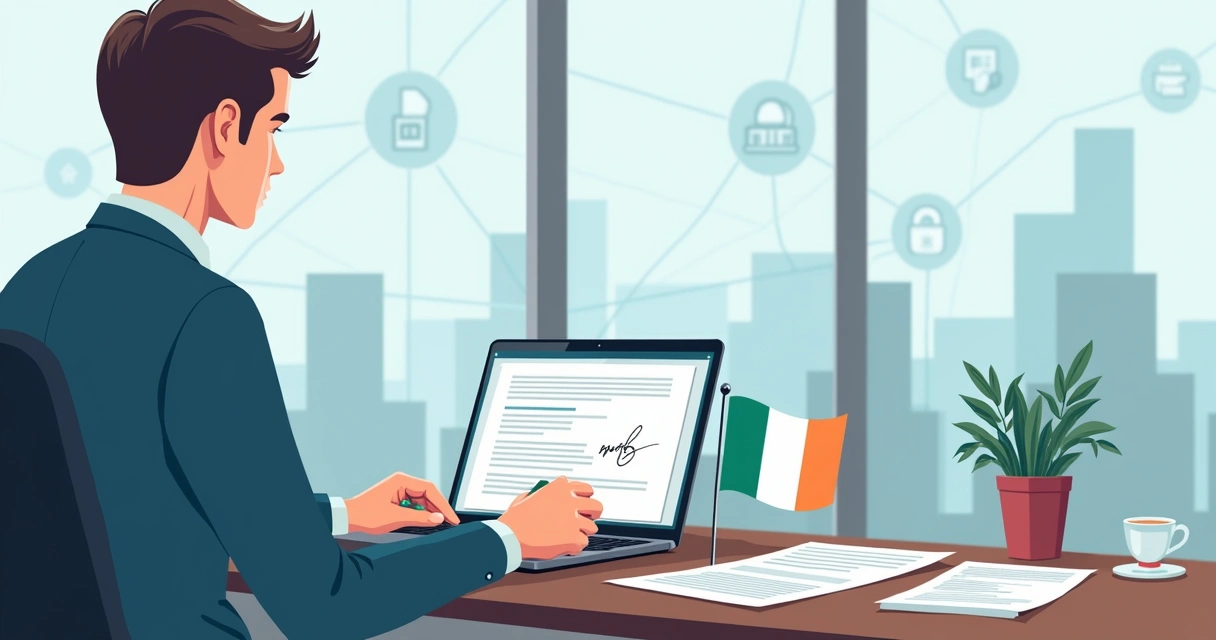A few years back, most Irish businesses still signed contracts with a wet pen and a bit of hopeful trust. Now, a signature doesn’t need to leave a mark of ink at all. For professionals, whether freelancing from Galway or managing a remote team in Dublin, understanding electronic signature validity in Ireland has become far more than a technicality. It determines whether an agreement stands or falls. Yet, the law and practice aren’t always as clear as we might like.
Maybe you heard a story: a builder waiting on a landlord’s wet signature, paperwork lost in the post, or a deal delayed for days because someone “was out of the office.” Once, that was just how things worked. But with digital transformation pressing forward, and with platforms like CloudSign.ie quietly changing expectations, businesses now expect a contract can move as fast as an email.
How e-signatures work in ireland
To start, it helps to know what we mean by electronic signatures. At its most basic, it’s any electronic way of indicating agreement to a document: ticking a box, typing a name, pasting a scanned signature. But in the eyes of Irish law, not all digital signatures carry the same weight, or the same protection.
There’s some subtlety here, which can come as a surprise. Irish law, much like EU law, recognizes three main kinds of e-signatures (as explained in detail by Lavelle Partners):
- Simple electronic signatures (SES): The most familiar. Typing your name, pasting an image. Practical, but less secure in identity proof.
- Advanced electronic signatures (AdES): These connect uniquely to the signatory, often using encryption tools, so the person is clearly identified and the document’s contents can’t be subtly tampered with.
- Qualified electronic signatures (QES): The most rigorous type, needing a secure device and a qualified provider. In the EU, QES are legally equivalent to handshake-and-paper signatures.
In practice, most businesses in Ireland use the first or second kind. It’s only for specific high-stakes documents that a QES is usually needed.
 The legal landscape: what really makes a digital signature stand
The legal landscape: what really makes a digital signature stand
Now, if you’re asking if a typed signature on a PDF is “legal”, well, it depends. Both the Electronic Commerce Act 2000 and the eIDAS Regulation (EU No. 910/2014) say that in Ireland, contracts can’t be denied effect just because they are electronic. That means an agreement signed online is, by default, just as binding as one signed with ink.
Not all signatures are created equal.
However, a few types of documents are excluded from using digital signatures, including:
- Wills and trusts
- Enduring powers of attorney
- Documents governing interests in real property
- Affidavits and statutory declarations
- Documents that must follow specific court or tribunal rules
That means for most normal business agreements, NDAs, sales contracts, onboarding forms, an e-signature works just fine. But for that will or house deed? Not so much (see the full list from Adobe).
Security, proof, and digital trust
The core question isn’t always “Is it legal?” Sometimes the real worry is, “If challenged, can I prove who signed and when?” This is where a simple scanned signature starts to show its limits.
According to a 2025 article from the Law Society of Ireland, advanced electronic signatures create a digital audit trail. This makes them far tougher to forge than a scribbled name on paper. The article clarifies that while some more “basic” e-signatures are often accepted in everyday transactions, for sensitive documents, it’s the verifiable trail, date, time, IP address, audit logs, that gives real comfort in the eyes of the law.
Trust lies in the proof, not just the process.
CloudSign.ie was designed with this precise worry in mind. Its AI-powered platform captures a granular audit trail for each action, ensuring every step of a deal is logged, secure, and ready to stand up if ever challenged. Unlike some older, less intuitive competitors, CloudSign.ie automates these logs without making things more complicated for your team.
Modern business and shifting attitudes
Ireland’s acceptance of digital signatures has, perhaps reluctantly, moved from “an exception” to “the norm.” Not everyone is fully on board yet, especially when it comes to documents traditionally requiring witnesses. A recent Law Society of Ireland article points out a lack of judicial decisions on the fine points. This has led to diverging views among Irish law firms, especially for deeds and documents that might, in theory, need a pen-on-paper witness.
Apparently, firms are urging the government to update and clarify the approach, but the message is clear: for most non-property and non-witnessed agreements, electronic signatures are fully recognized and enforceable.
What does this mean for business? The pandemic forced a digital leap forward: according to Crowe Ireland, the use of e-signatures in Ireland surged during 2020 and after, especially for remote deals. Old arguments against digital signing lost ground to the realities of remote work.
Using the right digital signature tool
With laws evolving and expectations rising, the choice of digital signature platform can matter almost as much as the signature itself. Some global providers like DocuSign and PandaDoc have popularized electronic signing, but for Irish businesses, there’s growing interest in tools built for the region’s unique needs and legal frameworks.
CloudSign.ie distinguishes itself by focusing on Irish law and business practices. Its built-in risk identification, contract renewal features, and integration options (for Google Drive, Slack, CRMs, and more) offer something broader, more automated, and, frankly, smoother than the often generic, international-first tools. The 14-day trial means teams can test these workflows in real Irish legal scenarios without any risk or card required.
Curious about the future of this technology? CloudSign.ie explores the future of electronic signatures and how businesses can adapt. Those interested in digital change management may find the platform’s roadmap and features align nicely with the digital transformation journey that has swept so many workplaces. For deep dives into automation and AI-driven document organization, their AI document management strategies section offers real guidance.
 Digital signatures and the irish future
Digital signatures and the irish future
One might wonder, will the legal framework for digital signing in Ireland remain tangled? Change feels slow, but the trend is set: more businesses expect contracts to move digitally. As platforms become smarter and more transparent, confidence in digital contracts, like those created and managed with CloudSign.ie, will only grow.
For professionals still hesitant, the best step is to test out what works, and what doesn’t, for your own workflow. Begin with a pilot contract, check the audit trails, and see how seamless the process can really be. More on these strategies and evolving business needs is always available in the full CloudSign.ie blog and their official home page.
The signature of the future is digital, and in Ireland, it’s already here.
Thinking about securing your next digital contract? CloudSign.ie invites you to try its platform free for 14 days, no strings, and no need to commit just to see how powerful and practical modern digital signing has become.
Frequently asked questions about electronic signatures in ireland
What is an electronic signature ?
An electronic signature is any electronic method indicating a person intends to sign a document. This can be as basic as typing a name, clicking “I agree,” or using specialized signature apps. The type can range from a simple scanned name to a complex digital process involving encryption and identity verification.
Are electronic signatures legally binding in Ireland?
Yes, for most business contracts, electronic signatures are fully recognized under the Electronic Commerce Act 2000 and eIDAS Regulation, provided everyone agrees to use them. They are considered legally binding, though some documents, like wills, real estate deeds, or certain court papers, must still be signed by hand (read more about these exceptions).
How do I create a valid e-signature?
The easiest way is through a digital signature platform like CloudSign.ie, which provides a secure audit trail and user verification. For simple cases, merely typing your name, using a stylus, or clicking to accept terms may suffice. For sensitive documents, however, using advanced or qualified electronic signatures ensures the signature is uniquely linked to you and that the document integrity can be proven (see the Law Society of Ireland guidance).
Where can I use electronic signatures in Ireland?
You can use electronic signatures for almost all business agreements: contracts, employment forms, sales deals, procurement, NDAs, and more. Excluded documents include wills, trusts, matters involving land or property, and some legal declarations, which must still follow paper-based processes.
What laws govern e-signatures in Ireland?
Electronic signatures in Ireland are governed mainly by the Electronic Commerce Act 2000 and the EU’s eIDAS Regulation (EU No. 910/2014). These rules state that electronic signatures are valid, and contracts can’t be denied enforceability just because they’re electronic, although certain classes of documents (as mentioned above) are exceptions. Detailed insights can be found in the Crowe Ireland overview.
